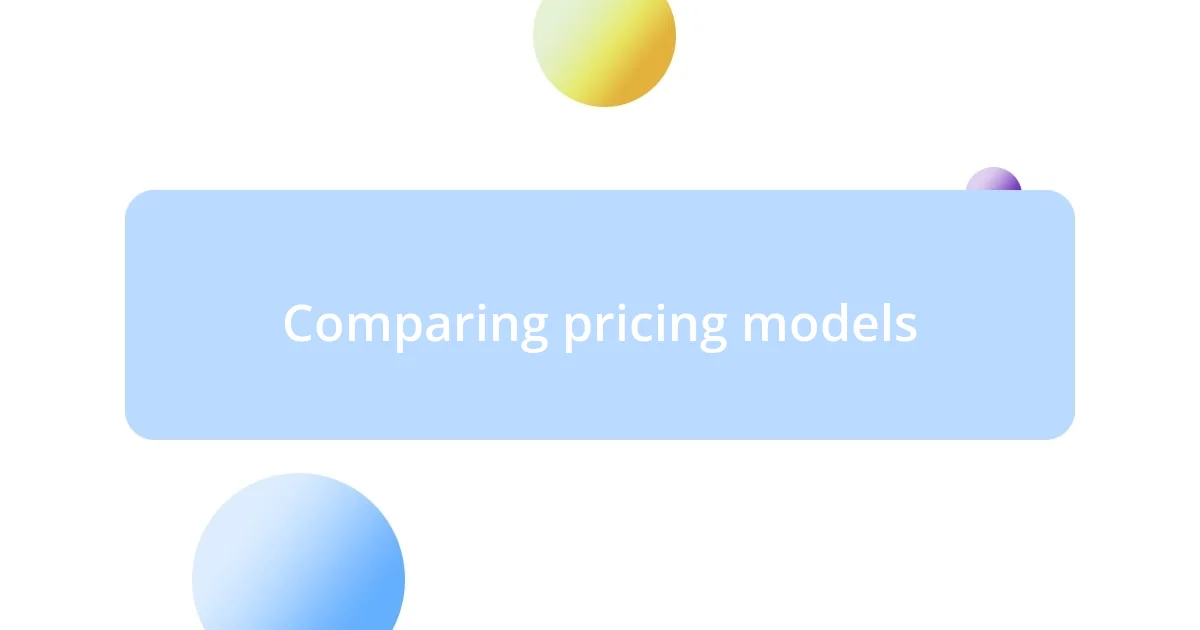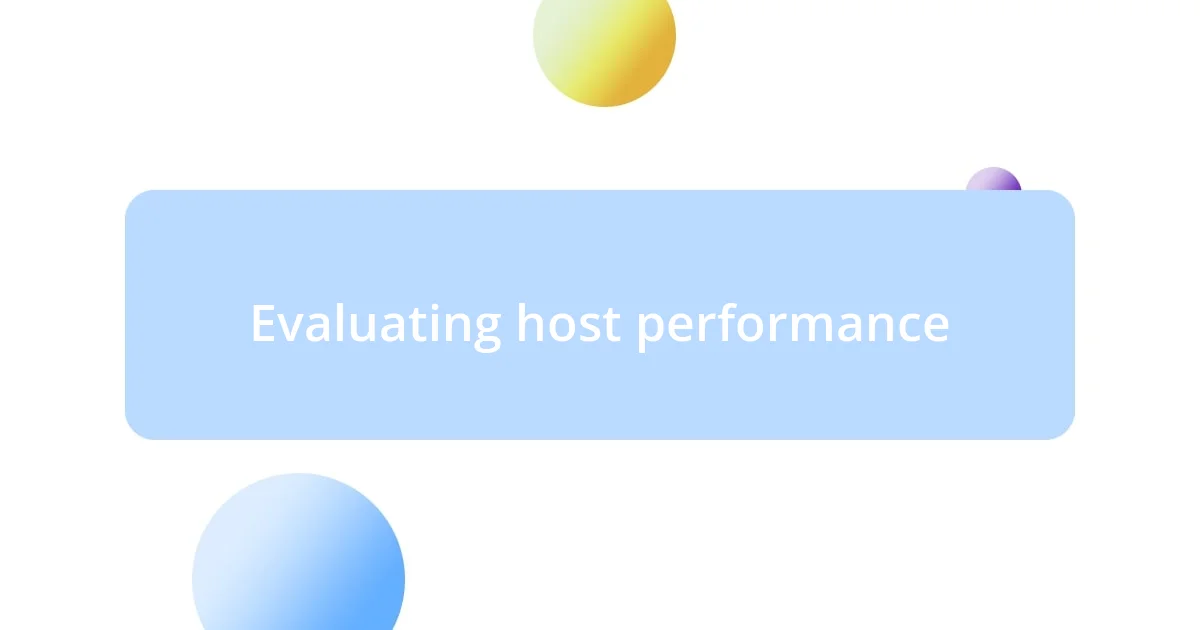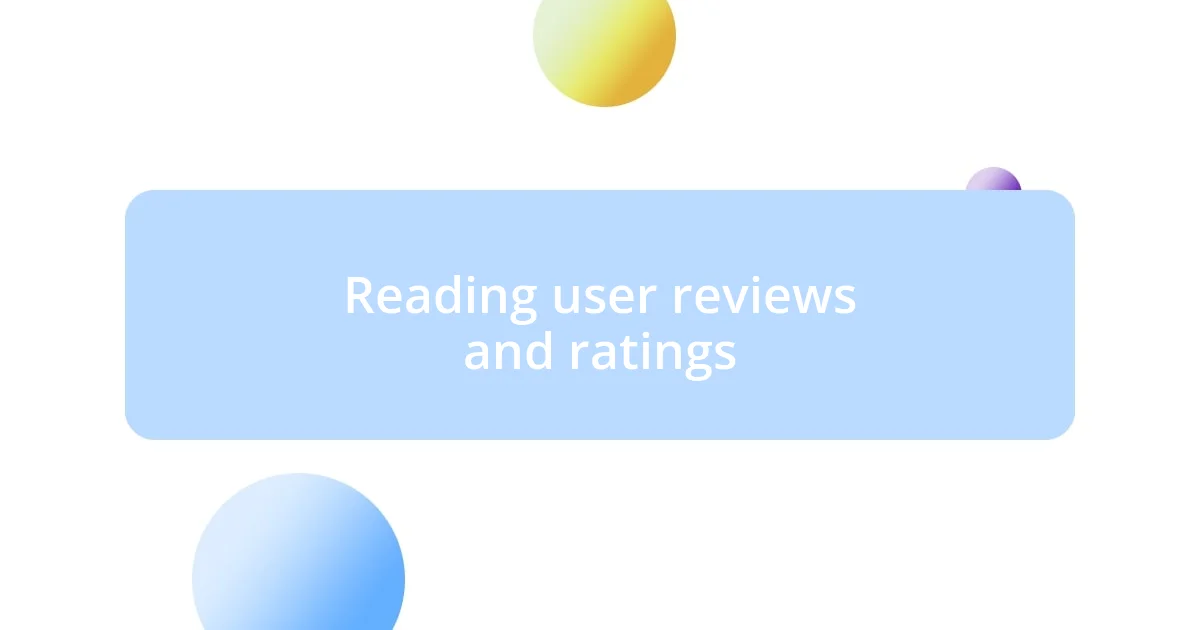Key takeaways:
- Understand different hosting types (shared, VPS, dedicated, cloud) and identify your needs (purpose, traffic, technical skills) to choose the right option.
- Compare pricing models carefully, considering long-term costs versus initial offers, and explore discounts through promotions or coupon websites.
- Read user reviews for real-life insights on performance (uptime, speed, support) and trust your instincts when selecting a reliable hosting provider.

Understanding hosting types
When diving into the world of hosting types, I often find myself reminiscing about when I first started my website. The myriad of options felt overwhelming—shared, VPS, dedicated, and cloud hosting are just a few. Have you ever felt like you were trying to decode a secret language? Each type caters to different needs and budgets, making it essential to understand what you really require.
For example, shared hosting is perfect for beginners looking to save some cash while getting their feet wet. I remember my early days on a shared server, thrilled to see my website live but also challenged by limited resources. Do you want to scale your site later? If so, you might want to consider VPS hosting, which offers more control and flexibility as your needs grow.
On the other hand, dedicated hosting is like having your own private island on the internet—fantastic for high-traffic sites, but it’s a commitment. Have you ever thought about how much reliability means for your online presence? The peace of mind that comes with it can be worth the investment, especially if your business or passion project depends on it. Understanding these nuances helps in making informed decisions, ensuring you get the most bang for your buck.

Identifying your hosting needs
To identify your hosting needs, the first step is to clarify what you aim to achieve with your website. I remember when I was setting up my initial blog; I focused heavily on sharing personal stories and connecting with readers rather than on traffic or e-commerce. Defining your primary objectives—whether blogging, e-commerce, or portfolio showcasing—will heavily influence the type of hosting you require.
Another key factor is the expected traffic. Picture a bustling café where you might struggle to find a seat—too many visitors without adequate space can lead to chaos. I learned this the hard way after launching a promotion that drew more visitors than my shared hosting could handle, leaving my site slow and frustrating for users. If you anticipate growth or spikes in traffic, investing in a more robust solution like VPS or dedicated hosting might save you headaches down the road.
Don’t forget about the technical skills you possess. If coding makes your heart race while others shy away from it, you can probably handle a more complicated set-up. I once dove into configuring a server myself, only to realize that the learning curve was steep. Your comfort level with technology will guide whether you can manage shared and managed options or if you should opt for something simpler that offers support.
| Factor | Considerations |
|---|---|
| Purpose | Identify objectives like blogging or e-commerce. |
| Traffic | Estimate expected visitors to decide on resources needed. |
| Technical Skills | Assess your comfort level for managing the server. |

Comparing pricing models
When comparing pricing models for hosting, it’s vital to understand the differences between options like monthly, annual, or pay-as-you-go plans. I recall a time when I opted for a tempting monthly deal, only to realize that the costs skyrocketed when I renewed. It taught me to look beyond the initial price tag; it’s often the longer-term commitment that offers real savings. Always weigh the benefits versus the total cost over time.
Here are some pricing models to consider:
- Monthly Plans: Flexible but can be more expensive in the long run.
- Annual Plans: Typically provide a discount for upfront payment.
- Pay-as-You-Go: Costs vary based on usage, ideal for fluctuating traffic.
- Tiered Pricing: Gives options based on resources needed, allowing scalability.
- Promotional Offers: Often available for first-time users; read the fine print.
Each model offers something different, so take a moment to reflect on what aligns with your financial plans and website goals. It’s a bit like choosing a meal—while a fancy dish may look appealing, sometimes the simple, hearty option nourishes better in the long run.

Evaluating host performance
Evaluating host performance involves looking at factors like uptime, speed, and customer support, which are crucial for your website’s success. I remember the pent-up frustration of my first website when it experienced frequent downtimes—it’s disheartening to see your efforts sink into a void of error messages. Uptime guarantees of 99.9% or better are something I now always look for, as they speak volumes about a host’s reliability.
Speed is another vital aspect of performance that I often emphasize. Early on, I overlooked how page load times directly affect user experience; a slow site can deter visitors faster than you can blink. Tools like Google PageSpeed Insights can provide a snapshot of how your site performs, and I always recommend testing this before committing to a hosting provider.
Customer support, too, can make or break your experience. After facing a confusing technical glitch once, I reached out for help at midnight and was pleasantly surprised by the quick response. Reliable support reassures you that whatever happens, there’s someone available to guide you through it. So, ask yourself: Do you feel comfortable relying on your hosting provider during critical moments?

Looking for discounts and promotions
When I’m on the hunt for hosting discounts, I feel like I’m on a treasure hunt. I often find that surfing through various websites during sales events, like Black Friday or Cyber Monday, can yield amazing deals. One time, I managed to snag a year’s worth of hosting for half price by simply being patient and keeping an eye out for those fleeting promotions. It’s a small effort that can lead to substantial savings.
Signing up for newsletters from hosting companies is another strategy I swear by. They frequently send out exclusive discounts and promotions that aren’t advertised anywhere else. I remember opening my inbox to discover a surprise 30% off just because I subscribed; it felt like finding money I didn’t know I had! If you’re not already doing this, you might be missing out on serious savings.
Don’t forget to check coupon websites where users share promo codes. I once stumbled across a code that not only provided a discount but also added bonus features like free domain registration. It’s like getting double the value! Have you ever tried these avenues? You might be surprised at how many options are out there waiting just for you.

Reading user reviews and ratings
Reading user reviews and ratings is an essential step in finding affordable hosting that truly fits your needs. I remember scrolling through countless reviews before choosing my current provider; it felt overwhelming yet enlightening. Users often share their real-life experiences, which can reveal a lot more than the glossy marketing materials ever could. Have you ever been swayed by a nightmare story that made you rethink your choice? It happens!
It’s fascinating to see how the collective voice of users can highlight both strengths and weaknesses of a hosting service. I’ve often found that a mix of positive and negative reviews gives the most balanced perspective. Once, I came across a host praised for its speed but slammed for poor customer support. That served as a crucial red flag, reminding me that even the fastest server won’t help if no one’s there when something goes wrong.
Don’t just glance at the star ratings—dive deeper into the written comments. I recall a time when a seemingly great host had a plethora of five-star ratings, yet some users mentioned persistent downtime during peak hours. When searching for a budget-friendly option, how often do we inadvertently overlook significant issues that could affect our websites? Taking the time to read the details can save you from future headaches and guide you toward a more reliable choice.

Making the final decision
When it comes to making that final decision, I often find myself weighing the pros and cons of each hosting option with careful consideration. I vividly recall one instance where I had narrowed my choices down to two providers. Ultimately, it wasn’t just about price; I paid close attention to the features that would make my online experience seamless. Have you ever experienced that moment of clarity when all the details suddenly become clear? It truly helps.
I also like to visualize how each hosting service aligns with my long-term goals. After all, it’s about more than just saving money today; it’s about ensuring that my future needs will be met. When I was launching my first blog, I passed on a cheaper option that lacked scalability, and boy, did I regret that later when my traffic surged! This reflective process can provide a sense of reassurance—knowing I made the right choice for my situation.
Finally, I can’t stress enough the importance of trust in a hosting provider. If you feel uneasy about a company’s reputation or service reliability, it’s worth considering that instinct. I was once drawn to a provider with flashy promotions but discovered plenty of red flags in reviews afterward. Trust your gut—it’s often the best guide when navigating this crucial decision. After all, a hosting service isn’t just a short-term choice; it’s a partnership that will support your online presence for years to come.














